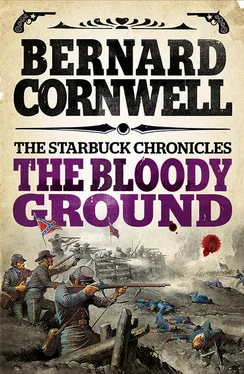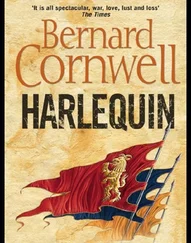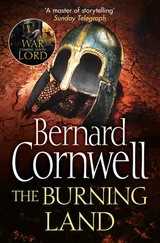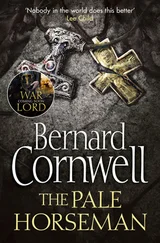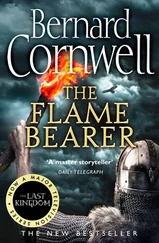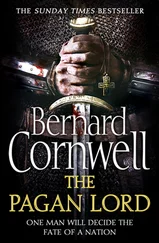A horse whinnied. It was hard to tell what direction the sound came from, at first it seemed to come from behind him, but then Billy heard the slow thump of hooves from in front of him and so, confused, and very cautiously, he raised his head out of the leaves until he could see across the corn. The shadows were harsh among the farther trees, but suddenly, in a slash of bright sunlight that cut across the dark, he saw the horsemen. Northerners! Blue coats. There were glints of reflected sunlight from saber scabbards, belt buckles, curb chains, carbine hooks, then a flash of white as a horse rolled its eye and sneezed. The ears of the other horses pricked forward. The wary cavalrymen had stopped at the corn’s edge. There were a dozen or so troopers there, carbines at the ready, all watching across the crop toward Billy’s left, and it was their watchfulness that kept Billy motionless. What was worrying them? He turned very slowly, but could see nothing. Were there rebels nearby? A bluebird flitted above the corn and Billy decided the bright feathers were a good omen and he was about to stand fully upright and shout toward the cavalrymen when suddenly their leader made a gesture with his hand and the troopers spurred their horses out into the corn. Billy stayed still. One of the cavalrymen had holstered his carbine and scraped his saber free of its scabbard, and that persuaded Billy that this was not a good time to attract the troopers’ attention. One shout now and a volley of minie balls could be his answer and so he just watched as the horses advanced noisily through the stiff cornstalks.
A horse whinnied again, and this time the sound was definitely behind Billy and he turned softly, parted the screen of leaves, then peered hard through the dappled shadows of the woodland. He was holding his breath and wondering what the hell was going on, then suddenly he saw a movement down by the far end of the cornfield and he blinked sweat away from his eyes and saw that there was a horse there. A riderless, lonely horse. A horse all on its own. A horse that seemed to be tethered. A horse with a saddle and bridle, but no rider. A horse, he thought, for Billy Blythe and he wondered what would be the safest way to attract the attention of the nervous Yankee troopers when suddenly a blast of rifle fire ripped the warm afternoon to shreds.
Billy cried aloud with fear and dropped to his haunches. No one heard his cry. for the Yankee horses were screaming terribly. There was a great thrashing sound from the corn, then more rifles fired and suddenly the hateful rebel yell was sounding and a voice was roaring orders. It had been an ambush. One riderless horse had been the bait that had sucked the Yankees down the long narrow cornfield to where the rebels had been hidden among the trees, and now the horsemen were either dead, wounded, or desperately trying to gallop away. Two more rifles cracked and Billy saw a blue-coated trooper arch his back, let go of his reins, and fall backward off his galloping horse. Two more riderless horses galloped north while a trooper was running desperately with his scabbard held free of his legs. Two Northern horsemen seemed to have made it safely into the shelter of the far trees, but otherwise there seemed to be no survivors from the small Yankee patrol. It had taken less than a minute.
“Fetch the horses!” a voice snarled. A Yankee in the corn was calling for help, his voice desperate with pain. A horse was whinnying, then a flat, hard shot abruptly ended the pathetic sound. Rebel voices laughed, then Billy heard the scraping rattle as a rifle was reloaded. The rebels were evidently collecting the horses; valuable prizes for an army already short for good cavalry mounts, and Billy hoped they would be content with that booty, but then the officer shouted again. “Look for any survivors! Careful now, but look good.”
Billy swore. He thought about running, but he guessed he was too weak to outrun a fit men and besides the noise he made would bring a slew of the bastards chasing after him, so instead he feverishly stripped off his blue coat and pulled on the threadbare gray jacket, and then he pushed the betraying blue garment deep under the bushes where he covered it with a thick layer of leaf mold. He buttoned the gray coat and buckled his belt about its waist and then he waited. Damn, he thought, damn and son of a bitch and damn again, but now he would have to play the rebel for a few weeks while he found another way to get back north.
Footsteps came nearer and Billy decided it was time to play his role. “Are you Southern boys?” he called aloud. The footsteps stopped. “The name’s Billy Tumlin!” he called out, “Billy Tumlin from New Orleans.” There was no future in using his real name, not when so many men in the Confederacy were eager to test a rope on Billy Blythe’s gullet. “Are you boys Rebs?” he asked.
“Can’t see you,” a voice said flatly, neither friendly nor hostile, but then came the unmistakably hostile sound of a rifle being cocked.
“I’m standing up, boys,” Billy said, “standing up real slow. Standing up right plumb in front of you.” Billy stood and held his hands high to show he was not armed. Facing him were a pair of scruffy rebels with bayonet-tipped rifles. “Thank the good Lord above, boys,” Billy said, “praise His holy name, amen.”
The two faces showed only caution. “Who did you say you was?” one of the men asked.
“Captain Billy Tumlin, boys. From New Orleans, Louisiana. I’ve been on the run for weeks now and sure am pleased to see you. Mind if I lower my hands?” He began to lower his arms, but a twitch of a blackened rifle muzzle put them back up fast.
“On the run?” the second man asked.
“I was taken at New Orleans,” Blythe explained in his broadest Southern accent, “and I’ve been a prisoner up north ever since. But I slipped away, see? And I’m kind of hungry, boys. Even a piece of hardtack would be welcome. Or some tobacco? Ain’t seen good tobacco since the day I got captured.”
An hour later Captain Billy Tumlin was introduced to Lieutenant Colonel Ned Maitland, whose men had discovered the fugitive. Maitland’s regiment was bivouacking and the smoke from hundreds of small fires sifted into the early evening air. Maitland, a courtly and generous host, hospitably shared a leg of stringy chicken, some hard-boiled eggs, and a flask of cognac with the newly escaped prisoner. He seemed blessedly uninterested in Blythe’s supposed experiences as a captive of the Northerners, preferring to discuss which prominent New Orleans families might be common acquaintances. Billy Blythe had spent just long enough in New Orleans to pass that test, especially when he figured that Maitland knew less about the city’s society than he did himself.
“I guess,” Maitland said after a while, “that you’d better report to brigade.”
“I can’t stay here?” Blythe suggested. Maitland would be a considerate commander, he reckoned, and the Legion would be serving close enough to the Yankees to give Blythe and easy chance to slip across the lines.
Maitland shook his head. He would have liked to keep Billy Tumlin in the Legion, for the considered most of his present officers to be well below the proper standard, but he had no authority to appoint a new captain. “I could use you,” Maitland admitted, “I surely could. It looks like we’ll all be moving north soon so there’ll be plenty of fighting and I’m not exactly fixed right with good officers.”
“You’re invading the North?” Billy Blythe asked, horrified at the thought.
“There’s nothing north of here but foreign soil,” Maitland observed dryly, “but sadly I can’t keep you in the Legion. Things have changed since you were captured, Captain. We don’t elect or appoint officers anymore. Everything goes through the War Department in Richmond and I guess you’ll have to report there. At least if you want wages, you will.”
Читать дальше
